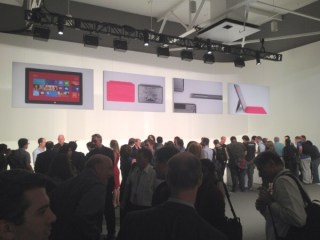Microsoft CEO Steve Ballmer speaks after the new tablet called Surface was unveiled during a news conference at Milk Studios on June 18, 2012 in Los Angeles, California.
13. Is there any chance at all that Microsoft will become the dominant maker of PCs? It’s not going to happen immediately. Odds are that it won’t ever happen. But if tablets overtake traditional PCs eventually (not unthinkable) and Microsoft becomes the dominant maker of Windows tablets (also not unthinkable) we could see the day when the company is a computer maker which also happens to license its software to other manufacturers.

Harry McCracken / TIME.com
14. What does this mean for the Microsoft Store? Surface is going to require some explanation, and it’s probably going to be more impressive if you see it in person. Microsoft’s own chain of Apple Store-like retail establishments will be the only place you’ll be able to try it out; all of a sudden, the notion of Microsoft ramping up the quantity of stores to Apple-like numbers doesn’t sound quite so whacko.
15. What does this mean for Best Buy? The nation’s largest electronics retailer has bigger problems to fret over. But it can’t be happy about the prospect of being denied a significant PC. I’d love to know whether Microsoft plans to expand Surface distribution rapidly, or keep it as a Microsoft Store exclusive.
16. What does this mean for Apple? Surface feels more defensive than offensive–less an attempt to crush the iPad than a move to make sure that Windows PCs aren’t crushed by the iPad in the coming years. I doubt anyone at Apple is panicky about its arrival, but if it does well, it could quickly turn into the iPad’s most serious rival. The iPad’s dominance is so complete at the moment that we don’t really know how Apple would behave if its tablet had a strong competitor.
17. What does it mean for Ultrabooks? Intel has poured vast amounts of energy and money into positioning the thin-and-light Windows notebooks known as Ultrabooks as the next great PCs. At the Hollywood event, Microsoft pretty much admitted that the Surface for Windows 8 Pro will compete with Ultrabooks when it said that it would be priced like them. If Surface sells well, Ultrabooks could come off as backwards-looking legacy machines rather than the PCs of the future.
18. Where does this put Android? Let’s just say it: Android on tablets has been a huge disappointment to date. Google is apparently going to start selling its own Android tablet–it will likely debut at next week’s Google I/O conference in San Francisco–but current wisdom says it’s going to be a cheap Kindle Fire competitor. Surface doesn’t have to be all that successful to knock Android tablets into third place; it’ll be fascinating to see if Google is OK with that happening, or whether it strikes back aggressively.
19. Does any of this mean much without killer Metro apps? Good hardware is important to Windows 8’s fate. But great apps–both ones from other platforms and ones that aren’t available on any other platform–are absolutely essential. Worst-case scenario, it’s possible that Surface turns out to be a very nice device that doesn’t do well simply because the software support isn’t there.
20. Will Surface be the Tablet PC that the Tablet PC never was? Surface for Windows 8 Pro supports a stylus as well as finger input. It’ll permit note-taking and sketching and all the other applications that were supposed to make Microsoft’s Tablet PC a landmark device a decade ago. I remain doubtful that there’s a critical mass of people who want to read their own handwritten notes on a computer, but there’s something almost touching about Microsoft revisiting the Tablet PC concept at this late date.
21. What if Microsoft had begun work on all this a half-decade earlier? Surface borrows its name, certain user-interface principles and perhaps some technologies from Microsoft’s pricey table-top computers. Those machines were announced back in 2007–here’s a piece I wrote about them at the time–and I suspect that the company sincerely thought they’d be everywhere by 2012. Instead, they never amounted to much. It’s tempting to fantasize about an alternate reality in which Microsoft skipped the Surface table research and proceeded directly to the Surface tablet. Instead of rushing to catch up with the iPad, the company could have rendered it less of a milestone by releasing a great tablet first.
22. Will Surface eliminate the distinction between PC and tablet? Microsoft’s press release only describes the Surface machines as “tablets” once. Otherwise, it calls them PCs. That reflects Microsoftian thinking, of course–when you dominate PCs, everything looks like a PC. But I think it’s healthy for everyone involved if the sharp distinction between tablet and PC goes away. Both Surface and the iPad are intensely personal; both let you perform computing tasks. They’re both PCs.
And here’s my last question for the moment:
23. What are your thoughts on Surface? See you in the comments.


